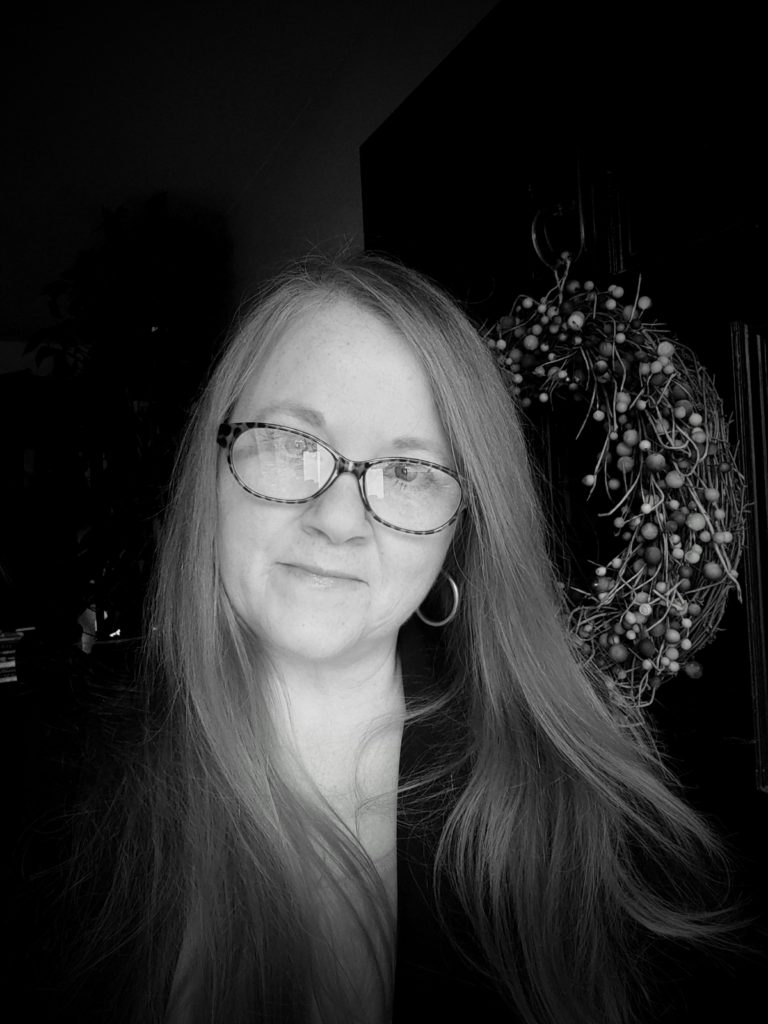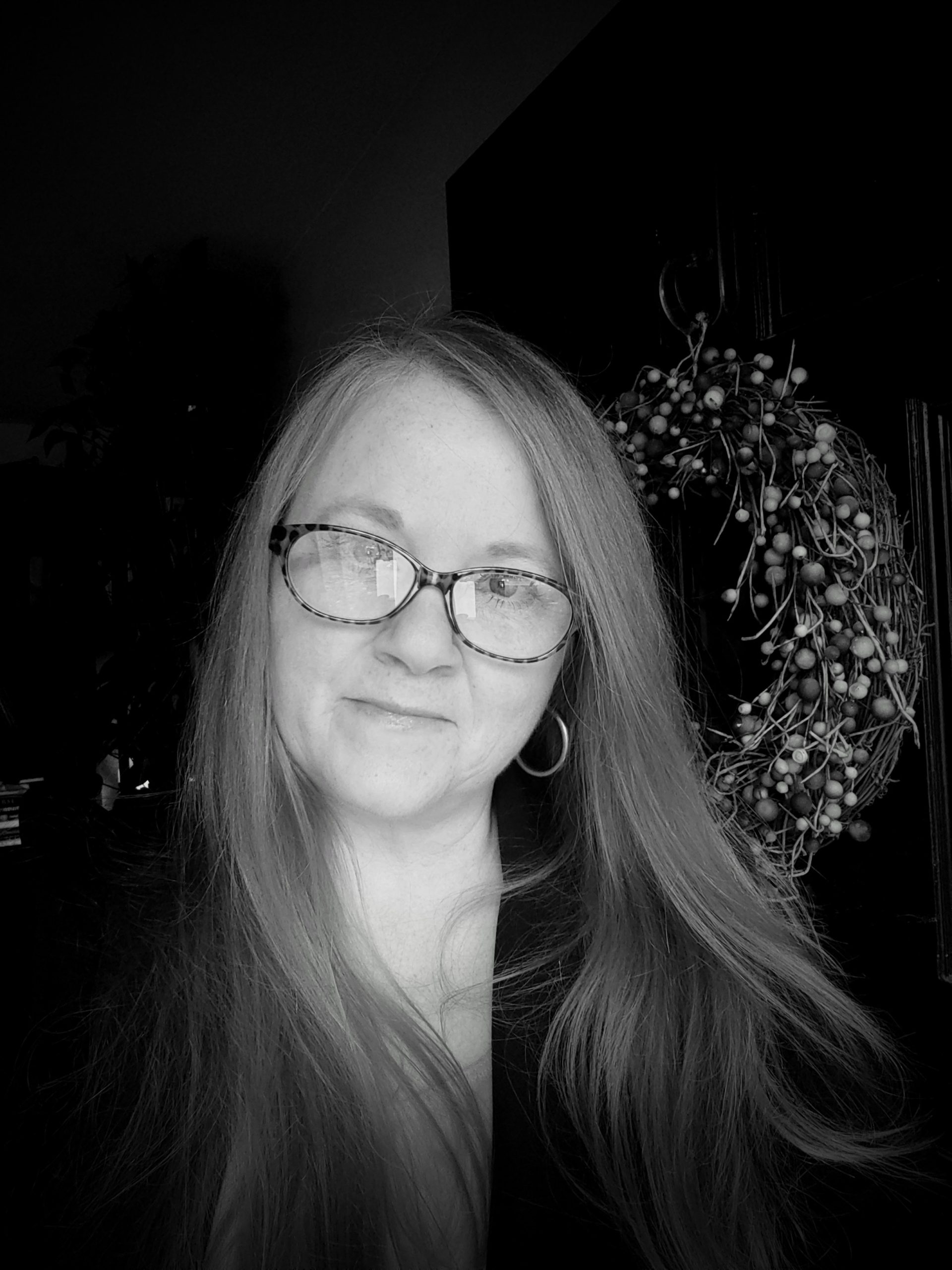Why do I write?
I didn’t know writing was something I enjoyed until I entered college as a returning student. Though, once I realized it, it made sense. English was my favorite class in high school, and these days, I love telling tall tales, exaggerating the facts, and placing clever twists on everyday events if it gives a good laugh to those who hear it. Back in the days where letter writing was the primary form of communication, I could give someone a migraine with a twenty-five-page letter. For real.
Is there an author who has most profoundly influenced your work?
I know writers say read, read, read, and most have read their whole lives, and that one book they loved is at the tip of their tongue. Unfortunately, that wasn’t the case for me. My parents didn’t buy me books, so reading wasn’t a habit I had ever developed. I spent most of my time outside as a kid, and as an adult, I genuinely loathed bookstores. It wasn’t until I entered college that I began to read. I can’t claim any one author as a favorite or an inspiration, but I wish I could.
Why did you choose Stonecoast?
When I was working on my bachelor’s, a classmate mentioned Stonecoast, putting the bug in my ear that a low-residency program existed. When I decided to get my master’s, I called Stonecoast and spoke to a woman, though I can’t remember now who she was. She made the program sound so exciting. I only applied at two colleges, Stonecoast and Emerson College in Boston, MA. Both accepted me. Stonecoast, however, had a more rigorous program than Emerson, and I believed it would better benefit my writing career. The concept of a mentor guiding me through the drafting of a novel psyched me out. Not to mention when I spoke to the staff at Emerson and Stonecoast, the team at Stonecoast was WAY more personable and welcoming. Can I say that without Stonecoast getting sued? It’s true.
What is your favorite Stonecoast memory?
My residency was virtual, which may, for some, deaden the experience, but not for me. I genuinely loved the workshops, talking to the other writers, and I LOVED listening to Lady Zen express her writing through song and music. I had goosebumps the whole time. Loved it. I can’t wait to see what memories my second virtual residency brings.
What do you hope to accomplish in the future?
I came to Stonecoast to learn to write novels, and that’s what I intend to do. Whether it’s through traditional publishing or self-publishing, I plan to write dark, gritty stories that shed light on mental illness. It’s such a taboo subject that, more often than not, society sweeps under the rug.
If you could have written one book, story, or poem that already exists, which would you choose?
Not having read much leaves me at a little bit of a disadvantage with this question, but I do have two favorites. I really enjoyed Game of Thrones—the books, not the television series. However, I DO wish Mr. Martin could get the next book published already. I also wish I would’ve written the series. He made bank. The second (I know the question says one book, but, oh well) is Gone Girl. It’s dark, and Gillian Flynn makes some great points about how women bend themselves to be more liked by men. She also writes one mean female character.
Powder
By Heather Dooley
Carmen trekked across the hospital parking lot. The space where she left her car was so far from the building, she might as well have parked in China. The lot was dark. Visitor safety clearly wasn’t a concern for Burlington Hospital.
The nighttime surroundings were a wash of greys. Light grey clouds, illuminated by the city’s lights below, drifted beneath slate clouds above. Nickel-sized snowflakes fell, fat and lazy, from the sky and brushed against Carmen’s cheeks like soft, cold kisses. The tufts grew fatter by the minute, thickening the white cloak that smothered the city’s bustling sounds. Carmen’s feet crunched the snow flat as she walked, and a distant highway rumbled in the distance. Otherwise, all was quiet. She remembered her father used to call snow powder. ‘Powder as deep as that makes a man feel trapped, miserable. I hate that powdery stuff,’ he’d say in the dead of winter, hands in his front pockets, standing in front of the window, scowling at the snow-covered yard.
And right now, Carmen agreed. She cursed at the snow that poured over the rims of her tennis shoes, packed itself beneath her heels, then melted into her socks as she paced forward. Carmen had a bigger chance of finding a leprechaun than a pair of winter boots at any store in Charleston. She’d wanted to stop at a Walmart along the way—but her brother’s words on the phone repeated in a loop in her head. “I thought you should know, ma’s in the hospital,” Billy had said. “She’s been asking for you.”
“I don’t know if I can make it home, Billy.”
“The doctor thinks Ma’ might’ve had a stroke. She looks real bad.”
“I’ll see what I can do.” Carmen wanted to be there for her brother. The boots could wait until later.
Each of the hospital’s twelve stories of windows glowed with cold, white light. Carmen’s stomach tossed and turned as she neared the front door. Even as her mother lay on her death bed, Carmen couldn’t trust her not to run her mouth, make a snide remark about her hair, her weight, her clothes, her aging face, her failing marriage.
Carmen worried about something else as she trudged along: Seeing her family’s monsters. She remembered seeing them when she was a child, lurking behind the closets in the shadows, their pupils shining like silver dollars deep within the basement’s gloom. The creatures trailed her parents wherever they went as if magically tethered to her mother and father’s ankles. One day, Carmen mustered the courage to ask her parents where they got their monsters, but they both denied that monsters existed. Still, Carmen knew they existed because she saw the beasts’ wandering eyes every day as they passed each other. She couldn’t help but feel like they watched her and her brother with yearning.
What if she saw the beasts again? The image of her last encounter with her father’s beast appeared like a mirage in her distant memory, hazy and fragmented, but she knew she saw the creature plain as day the night he had died. Carmen and her mother had found him inside the car, garage door shut, engine running, but her father wasn’t quite gone. The doctors labeled it a suicide, asphyxiation from carbon monoxide.
Later that night, Carmen’s mother had forced her and her brother to drive with her to the hospital. When Carmen entered her father’s room, the beast stood next to his hospital bed, wringing hands like a gorilla’s, black, massive, and leathery. Its brown eyes shifted between her father and her brother, pupils dilated as big as saucers, and the thing’s nostrils snorted with excitement as it watched her father diminish. Carmen’s father released one last breath as his gaze emptied and drifted to the ceiling. Then it was as if the magical tether snapped: the beast lumbered to her brother. Billy stared at the monster in horror as it approached him and stood at his side like it chose him. Carmen knew he didn’t want it, but from that day on, it had followed him wherever he went.
Carmen stood outside her mother’s hospital door, just beyond its threshold, preparing to step inside. Antiseptic fumes lingered in the stale air; they were the smells of disease and death.
She stepped into the room. Were those people tucked in the corners or shadows? Carmen didn’t look. She focused on her mother lying in her bed, arms at her side, eyes closed, asleep or unconscious. Billy was right. She looked bad, like someone else. Her mother typically wore her hair in neat, short curls, but now it lay in a tight silver mat against her head, and loose strands clung to hallowed cheeks. Her eyes sunk into two purple circles, and her thin lips pulled into the frown Carmen had seen for most of her childhood. That frown was the only thing that made her mother look like herself.
“She’s already gone,” Billy said from a chair planted next to their mother’s bed, in Carmen’s peripheral.
Silence hung in the room, thick as humidity, no hum of life-giving machines, and no IV lines vining her mother’s arms. Someone shifted and moved from the corner toward the door where Carmen stood, but she couldn’t take her eyes off her mother. A second horrible chapter of her life had come to an end, and she didn’t know whether to laugh or cry.
“Why didn’t you call me?”
“I did. You didn’t answer.”
“I was driving. I probably didn’t have a signal. Did you leave a message?”
“Yep.” Billy kept his eyes on his mother.
“I’m sorry, Billy. I got here as fast as I could,” Carmen’s voice stuck in her throat and came out as a whisper.
Silence sat in the room so long, Carmen looked to her brother, certain he was angry with her, and, standing behind him, tucked in the corner, big and menacing, was his beast. Its big emerald eyes locked on her face as it emitted a warning grumble, low and guttural. Carmen’s heart hammered against her ribs.
The Davis household had but one family rule: don’t talk about the family beasts, so Carmen bit her tongue and averted her stare, hoping to avoid a confrontation. Yet she noticed the beast resembled her brother more than it had when they were younger. It once had umber eyes, dark as strong coffee, and thick and shiny ebony hair like their father. Except for the two-inch fangs that pressed through its glossy upper lip, it used to have perfect teeth. But chestnut hair now covered the beast’s hide like a shag carpet, like the tangle of red hair piled on her brother’s head, and one of its fangs poked out at an irregular angle, a snaggle tooth. Yes. She was certain. It used to resemble her father.

Heather Dooley enjoys living in the nine months of rain and darkness in Washington State. Though she claims no particular genre, she enjoys writing fiction that gravitates toward darker subject matter, abuse, neglect, suicide, depression, any of the general impacts mental illness has on the individual or society as a whole. She graduated with Honors from Whatcom Community College, then magna cum laude from Western Washington University with a degree in English and Creative Writing. Heather is a first-semester student, A.K.A “Firstie,” at Stonecoast in Maine, and she’s earning her MFA in Popular Fiction. She’s eagerly anticipating her far-off graduation in 2023. She’s currently a first reader for the Stonecoast Review.
